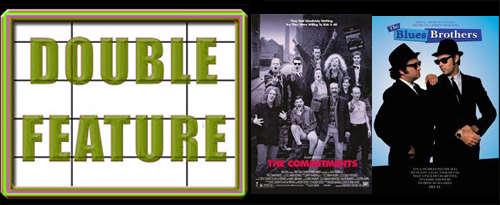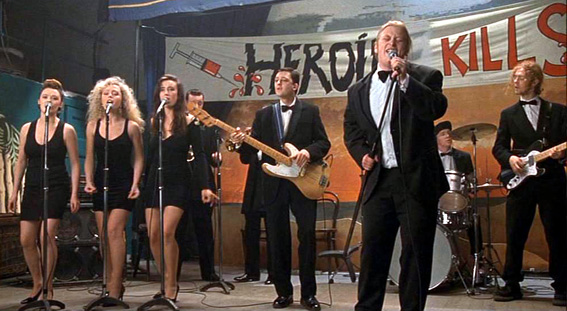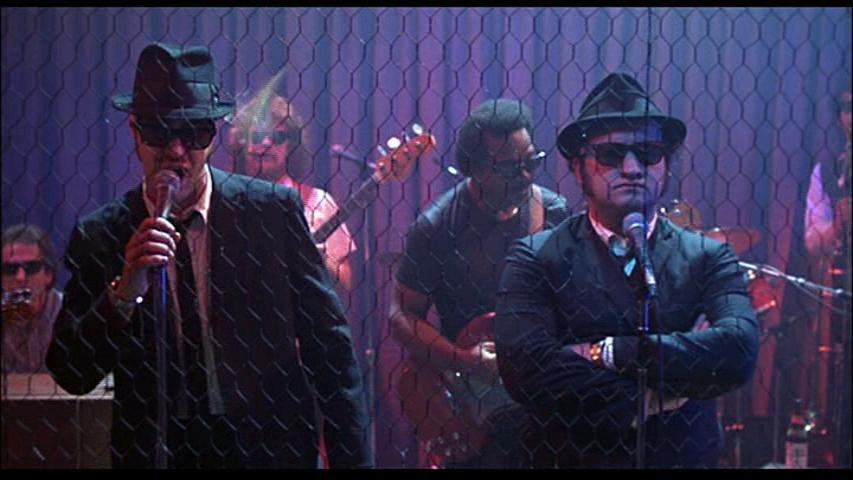
The double feature is cinema appreciation at its most basic. The mere act of pairing two films together – whether the bond be subject matter, central theme, a certain actor or filmmaker, or something outside-the-box conceptual – causes them to take on a different sort of life. A new relationship is formed with the viewer. You pay attention to new aspects and journey down unfamiliar avenues when you view films through Double Feature Goggles. Even when the linking bond is comically tenuous, the double feature magic is there. And I’m the kind of guy who derives just as much pleasure from creating a double feature as I do from watching one. Aside from amusing myself, hopefully I can give some people ideas for their next movie night.
The Double Feature: The Commitments (1991) and The Blues Brothers (1980).
The Connection: A story centering on the formation of a musical group. Actual musicians playing their instruments both on camera and on the soundtrack. And more interestingly, the exploration of white man’s love of African-American Blues, Soul, and R&B music.
Film 1: The Commitments – based on a novel of the same name, by Roddy Doyle – is a band genesis story. It tells the tale of Jimmy Rabbitte (Robert Arkins), who has become disgusted by the current state of Irish music. Jimmy dreams big and forms a band from the motley offerings of his Dublin neighborhood. The band, The Commitments, will play only American soul music (Otis Redding, James Brown, Aretha Franklin, etc). In classic form, The Commitments struggle to get along, while slowly gelling to become a fantastic band, only to devour themselves and implode just as they’re about to make it big. Not unlike Campbell Scott & Stanley Tucci’s Big Night, a major crux of the story is the band’s belief that a beloved music legend’s attendance at their climactic show will rescue them from obscurity. In Big Night it was big band legend Louis Prima, here it is soul legend Wilson Pickett (“In the Midnight Hour,” “Mustang Sally” for the soulless out there)
For my money, The Commitments is the best non-documentary film about music out there. Most films about musicians are based on true stories (Walk the Line, Control, Amadeus), and even if they aren’t, they’re generally telling a dramatic story, full of tension and/or melodrama (Crazy Heart, Country Strong), with the music serving more as colorful icing or punctuation. Narratively, The Commitments is an exercise in pure simplicity. There really isn’t much of a story, nor are their particularly structured scenes, as director Alan Parker (Pink Floyd The Wall, Midnight Express) gives the film a very Altman-esque style of loose multi-layered chatter, sans Altman’s multi-layered subplots fetish. Few films are more intimately about the music the characters are performing than The Commitments, as the film forgoes the standard subgenre tropes of focusing on a romance, strained friendship, drug problem, or personal demons. And because Jimmy has to teach The Commitments, these working-class Dublin kids, about Soul music, he is effectively teaching us too. It is the ultimate love letter.
This story-lite approach allows for a pretty remarkable casting stratagem. While there are actors (like Colm Meaney) scattered throughout the film in side roles, the central cast (the band), is made up entirely of real musicians (like Glen Hansard, who years later would front another amazing Irish film about the power of music, Once). Oddly enough, even Jimmy, who never touches an instrument or sings in the film, was a musician with no acting experience. Parker’s other golden idea was to record all the music live. There would be no lip-synching here. This raises the film’s feeling of authenticity to almost unparalleled levels. The end result is that The Commitments might as well be a documentary – Parker’s process of putting together his fake band can’t have been too wildly different from Jimmy’s process in the film, because the band isn’t fake (when the film first hit theaters The Commitments traveled the world putting on real shows).
Life imitated art in the case of Andrew Strong, who plays the pivotal role of “Deco,” the band’s lead singer, a young nobody slob who possess the croaky pipes of a bluesman with decades of drinking, smoking, and hollering behind him. Almost unbelievably, Strong was only sixteen fucking years old when the film was shot. Strong’s father was serving as the singer for Parker’s preproduction band (used to help select the songs to be used in the film), when after weeks of fruitless searching he suggested maybe his son should give it a try. Then, in real-life, when members of The Commitments – excited by their tie-in tour – wanted to continue as a legit band, it was Strong who blew up the whole thing with delusions of grandeur. Strong is pretty amazing in the film (especially when considering his age… and whiteness), and makes some pretty amusing Joe Cocker-worthy faces while singing too. Not an attractive man, but the lad has a golden voice; if the gold were soaked in whiskey and drug through the dirt for weeks.

Film 2: The Blues Brothers is one of those magical Hollywood accidents. In no sane world would a film studio finance this film with the budget it had. The story of an ex-con (John Belushi), who never takes his hat off, and his brother (Dan Aykroyd), who never takes his sunglasses off, who decide to get their old band back together to save the orphanage they grew up in, centering on two white guys singing vintage R&B music while disco still reigned king. Oh, and while being a loving ode to vintage R&B music, the film will also set a world record for most cars destroyed in a single film. But as fortune would have it, director John Landis and John Belushi had just made Animal House, and could pretty much do whatever the fuck they wanted as long as they did it together. So emboldened with the budget of a big action film, in between staging some amazing musical set pieces with some of the biggest stars in the Blues and R&B world, Landis and company also ran amok like kids with more money than they knew what to do with. A mall is destroyed, downtown Chicago is destroyed at a time when no movies were able to shoot in Chicago (at a cost of nearly $4 million for one sequence), and the most comically gratuitousness waste of money in film history occurs during the largest single-scene mutil-car pile-up (a record boringly broken by the uninspired sequel, Blues Brothers 2000). God bless those random moments of studio naivete.
For those youngsters out there who maybe don’t know, the Blues Brothers were characters from the original run of Saturday Night Live created by Belushi and Aykroyd. Aykroyd was a major Blues and R&B nerd, and with the help of SNL band member and future Letterman sidekick, Paul Shaffer, they formed a Blues Brothers touring band made up of some then under-appreciated legends of the R&B genre, like guitarist Steve Cropper and bassist Donald “Duck” Dunn. (Shaffer couldn’t appear in the film because of SNL obligations and was replaced by Murphy Dunne.) Viewed cynically, the Blues Brothers are one of the great Hollywood vanity projects, as two comedians who didn’t play any instruments, used their fame to form the ultimate karaoke fantasy. But Belushi was actually a great frontman, with a fairly acceptable voice, and the band’s existence and brief popularity helped foster a resurgence of respect for a type of music that had completely been buried by a decade of over-produced prog-rock and dance club garbage. So there’s that. And Aykroyd’s ongoing dedication to the Blues is pretty damn admirable, even if it is keeping him out movies (where I want him!).
The Blues Brothers was able to use classic R&B’s unpopularity to its advantage. Where The Commitments only hypothetically hints as the appearance of a music legend, The Blues Brothers showcases celebrities with the same kind of wanton excess as it crashes police cars. Cab Calloway, Aretha Franklin, Ray Charles, James Brown, Chaka Khan, John Lee Hooker, Carrie Fisher, John Candy, Twiggy, Frank Oz, and a rare on-screen appearance by Steven Spielberg. The movie is a bonkers musical romp.

Double Feature Goggles: White men can’t be blamed for loving Blues and Soul music. It’s great. And, from the perspective of someone learning to play an instrument, it is generally very easy to play. Of course, with rare exceptions, the history of white man blues is generally pretty embarrassing and comical (I always think of that white band performing after the African-American blues legend in Ghost World, singing about picking cotton). I think it is interesting how both films succeed within this reality. The Commitments addresses it head on, with what is probably its most memorable line, when Jimmy reassures the band that it is okay for them to be singing these songs: “Do you not get it, lads? The Irish are the blacks of Europe. And Dubliners are the blacks of Ireland. And the Northside Dubliners are the blacks of Dublin. So say it once, say it loud: I’m black and I’m proud.” The Blues Brothers gets away with it because the Blues Brothers were ostensibly a comedy act. This was the first SNL movie, after all. If the movie had feigned seriousness or legitimacy for one moment, it would have been a colossal blunder. At the end of the day there was nothing separating the motivations behind Belushi/Aykroyd from those of Bruce Willis playing harmonica with his blues band or Steven Seagal shredding guitar with his blues band. But Belushi/Aykroyd had the wherewithal to introduce their band in the guise of characters on a sketch comedy show. This wasn’t them – they were Jake and Elwood. They were able to take the Tenacious D route of being half-joke-half-serious.
As films, I like how incredibly different these two movies are, while still having the same goal at heart: to expose you to awesome music. One is glutinous, flashy, and cartoonish; one is threadbare and naturalistic. And interestingly, they don’t use any of the same songs (unless my memory is failing me).
A good band formation movie is a bit like a heist film, if done right. Each new member added to the team needs to be memorably introduced, so we don’t need to waste too much time with pointless exposition. I think its fun to see how the two different films introduce their respective members one by own as the super teams are being formed. As far as song staging goes, the films actually aren’t as different as one might expect. The Blues Brothers of course has a few big dance productions, but about 50% of its musical numbers are staged simply as the band performing realistically. And – like The Commitments – James Brown’s number was recorded live, as Brown notoriously was unable to lip-synch because of his improvisational style (ie, rampant drug habit). Both films have killer soundtracks worth owning on the own musical merit.